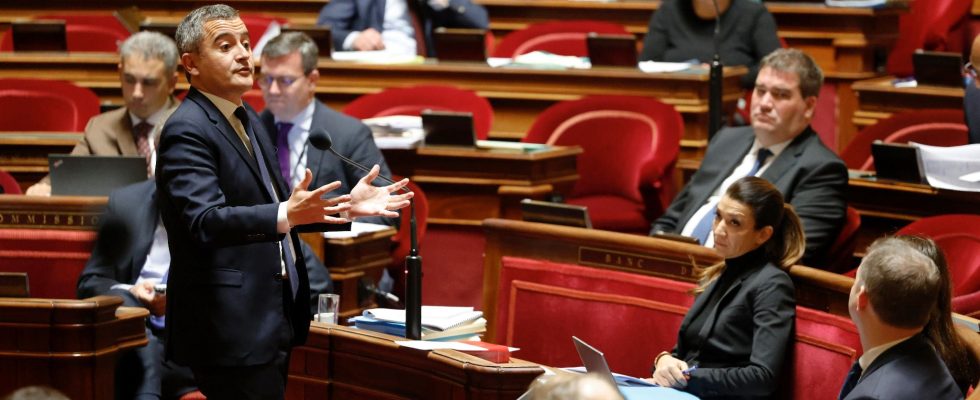Removal of barriers to the expulsion of delinquent foreigners, end of state medical aid, tightening of family reunification, regularization on a case-by-case basis in professions in shortage… The immigration bill, the examination of which has ended this Friday, November 10 in the Senate, underwent a toughening process in the upper house, far removed from the initial text.
The Minister of the Interior Gérald Darmanin has endorsed numerous measures, which correspond to his ambition to make it an “effective” reform, a tool of “firmness” to control immigration and simplify expulsion procedures. “This is a big step forward for the general interest,” he said on X (formerly Twitter) after the public session.
This version will be examined from December 11 by the National Assembly, which will in turn be able to modify it widely.
Simplified evictions
The text provides, in the event of a serious threat to public order or state security, to remove most of the protections against expulsion enjoyed by certain immigrants (with the exception of minors), including those who arrived in France before the age of 13 or residing in the territory for more than twenty years.
These provisions, desired by the government and toughened by the senatorial majority of the right and the center, target people who have been convicted of crimes or offenses punishable by five years or more of imprisonment.
As the Minister of the Interior Gérald Darmanin wished since the Arras attack, the withdrawal of the residence permit of a person who “adhers to a radical jihadist ideology” is also permitted by the text, according to Beauvau. On the other hand, confinement in detention centers for minors under the age of 16 is prohibited.
Family, health, nationality: serial toughening
Initially composed of 27 articles, the bill will include nearly a hundred when it arrives at the Bourbon Palace, with several turns of the screw. It now plans to “tighten the criteria for family reunification”, in particular by strengthening the conditions of residence and resources of an applicant.
State medical aid (AME), covering the health costs of people in an irregular situation, was abolished in favor of “emergency medical aid”, focused on “serious illnesses”, care linked to pregnancy or even regulatory vaccinations.
Other additions from the senatorial right: the establishment of “migratory quotas”, the reinstatement of the offense of illegal residence (only accompanied by a fine), the end of the automaticity of land law allowing children born in France of foreign parents to obtain French nationality upon reaching the age of majority… Development aid could be conditional on the issuance by third countries of “consular passes” necessary for expulsions.
Foreigners will also have to prove five years of residence to be able to benefit from allowances such as personalized housing assistance (APL) or family allowances, compared to six months currently, if this version came into force.
Reform of the asylum system
The government passed its structural reform of asylum with a dual objective: to speed up procedures and expel more quickly, while the rate of execution of OQTFs (obligations to leave French territory) fell to 6.9% in first half of 2022. One of the measures aims to issue an OQTF as soon as an asylum application is rejected at first instance, without waiting for a possible appeal.
Foreigners’ disputes, which clog up the administrative courts, have been largely simplified. Twelve procedures now make it possible to contest an expulsion: this has been divided by three.
Regularizations in professions in tension
The flagship measure of the text was clearly restricted, after tough negotiations. Undocumented workers working in shortage occupations will be able to obtain a one-year residence permit “exceptionally” and not automatically as provided for in the initial project.
The procedure, at the hands of the prefects, is accompanied by multiple conditions, such as having worked twelve months over the last two years or respecting the “values of the Republic”. The measure nevertheless retains the government’s strong idea: that workers can submit a request for regularization themselves, without obtaining the approval of their employer, who does not always have an interest in it.
Still in the integration aspect, the Senate adopted the conditional issuance of a multi-year residence permit on mastery of a “minimum level of French”. To obtain it, you will now have to pass a language exam.
Rare social advances
The left, a minority in the Senate, obtained the reinstatement of some measures that the right intended to remove, such as the toughening of sanctions for employers of illegal labor and the obligation for employers to arrange working time. work to certain employees to allow them to take French lessons.
Final success, Friday: the vote on an amendment aimed at granting a temporary residence permit to undocumented immigrants who file complaints against their owners abusing unworthy accommodation conditions, to fight against slumlords.
